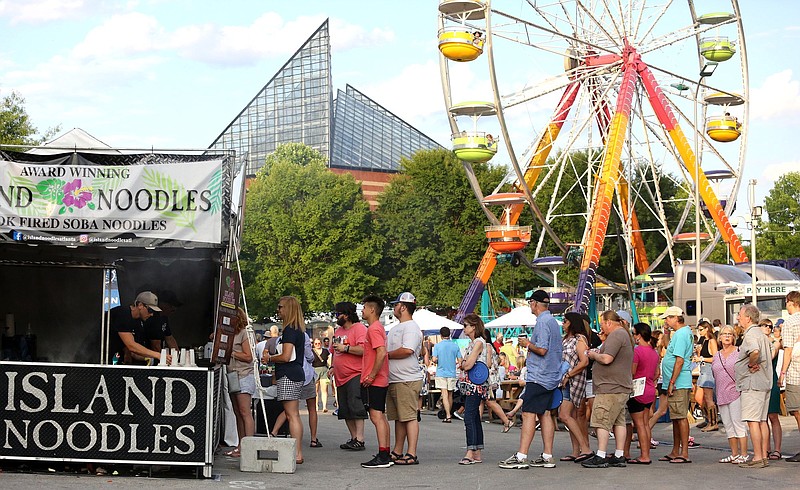Add "force majeure" to your list of new words and phrases to learn along with "social distancing," "coronavirus," "COVID-19," "PPE" and "N95 masks."
The coronavirus pandemic has turned the world upside down, and like so many other aspects of our previously normal lives, the entertainment industry is not only looking for answers to already asked questions, it is adding new questions every day.
And, as Jonathan Susman, special events manager for the city of Chattanooga said, "We haven't even started talking to the tort and liability lawyers yet. Not just with our legal department, but with the organizers - how this could affect insurance requirements, etc."
Right now, most in the entertainment world are struggling with questions like when live music might return and what it might look like. How do you hold a concert in a venue that normally holds 500, 5,000 or 50,000 people when social distancing and 50% capacity are required?
Another of the questions now to be asked and answered has to do with the force majeure clause now in many, though not all, contracts involving events such as concerts, festivals and sporting events.
As a Chicago-based attorney who specializes in the entertainment industry, Jeff Becker admits that the so-called force majeure clause is often overlooked. Even by other attorneys. That will likely change.
The term translates to "an event that could not be anticipated or controlled by either party." In the past, when it has come into play, it has usually been related to some sort of government shutdown, and rarely has it been triggered by a pandemic.
"I teach a music class every fall at DePaul [University], and we dig down pretty deep into contracts and really nerd out, but we don't spend a lot of time on the force majeure provision," Becker said during an interview on The What Podcast.
Becker said the clause, if included in a contract, is rarely read by his clients, which can include people in all parts of the music industry such as festivals, artists, promoters and even vendors and production companies that supply everything from lighting and staging to fencing.
"I'm very familiar with it," says Johnny Smith.
In addition to being a drummer, Smith is executive director of Songbirds Guitar Museum in Chattanooga, which also includes two live music venues, and owns a production company, Harmonic Production Services. He is now overseeing artist bookings for the Riverbend Festival. Force majeure is very much on his mind these days as Riverbend, which was scheduled to take place May 27-30, is hoping to reschedule in late fall.
Smith said the artist contracts can be complicated enough, but production companies, often small businesses, require as much as a 60% guarantee as early as six months out.
"And, they aren't giving that back if force majeure kicks in," Smith said.
Becker said his industry hasn't really seen anything like this, but that it will be a hot topic. The detail will be one of many facing an industry that has essentially been shut down since the middle of March, and one that doesn't show any signs of reopening until late fall, if then.
"It usually appears at the end of the contract and is often ignored," Becker said. "Most people just look at how much they'll be making and when do I show up. This is unprecedented."
The clause is similar to flood insurance for homeowners. If you live in a flood plain, you likely either can't get it, or it is so expensive you gamble you won't need it. But many people who live on ridges or mountains are surprised to learn that any water damage from a bad storm or a broken pipe can be considered "flood" damage, and if they don't have flood insurance they aren't covered should such damage occur.
The clause is designed to protect both parties, but like many contracts, the devil is in the details, Becker said. For instance, it can be worded such that should the event be shut down by something like a pandemic or a forced government closure, the contract could be terminated with no consequences to either party, or if there had been a guarantee paid to the artist as an advance, it could either stipulate that the artist must return the money or keep it.
As you can imagine, the bigger the artist, the more sway they hold in the matter.
Becker said that since the start of the shutdown he has had many conversations with festival and venue organizers and artists about force majeure and their contracts.
How it will affect the future of everything from small shows in bars to major festivals such as Bonnaroo, Lollapaloosa or Riverbend is unclear. he said. Will the venues, the artists or the promoters be liable should someone get the virus, for example, and will ticket prices go up to cover any new insurance policies regarding a pandemic?
"And, what will festivals do if there is no government shutdown, but people don't want to go? You lose your force majeure," Becker said.
Becker said he believes artists and managers are already looking at new ways to make money that don't involve performing in front of large audiences - online concerts, for example. But he points out that while fans now are understanding when it comes to low production values on some of them, that won't last.
"I've been advising my clients to do that since the beginning of this," he said.
Contact Barry Courter at bcourter@timesfreepress.com or 423-757-6354.
